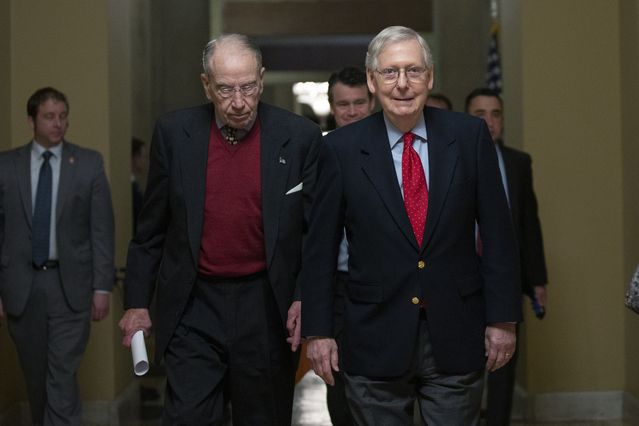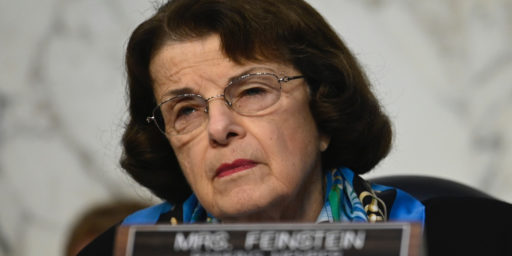Age, Illness, and American Politics
The controversies over our geriatric Congress continue.

NYT (“Injuries and Illness Slow Senators, as Well as the Senate Itself“):
A pair of high-profile absences has thrown the Senate into a state of uncertainty at a critical time, raising questions about whether Democrats will be able to conduct business and who will lead Republicans through a potentially chaotic period as they try to reclaim the majority next year.
Neither Senator Mitch McConnell, the Kentucky Republican and minority leader, nor Senator Dianne Feinstein, the six-term California Democrat, has been seen publicly in more than a month as the two octogenarians recover from injuries and illness.
After weeks of silence about his whereabouts and the details of his condition, Mr. McConnell, 81, who suffered a concussion and a broken rib in a serious fall last month, said in a tweet on Thursday that he would be back in the Senate next week, when Congress returns from a two-week recess.
“I am looking forward to returning to the Senate on Monday,” the tweet said. “We’ve got important business to tackle and big fights to win for Kentuckians and the American people.”
Ms. Feinstein, 89, who has also shared few specifics since her staff announced in March that she had been hospitalized with shingles, acknowledged on Wednesday that her illness would keep her out of the Senate for the foreseeable future as she recovers in San Francisco.
Both cases have highlighted the challenges of governing with a bare-bones majority in a body populated by an old and frail group of lawmakers.
[…]
Ms. Feinstein for years has suffered from acute short-term memory issues that have raised serious concerns among those who interact with her. She announced earlier this year that she would not run for re-election in 2024, making official an impending retirement that was long assumed and setting off a crowded, expensive and high-stakes Senate race in California to replace her.
But since her shingles diagnosis in February, she has missed 58 Senate votes, prompting some Democratic lawmakers, including Representatives Ro Khanna of California and Dean Phillips of Minnesota, to call publicly for her immediate resignation. Mr. Khanna is a co-chair of Representative Barbara Lee’s campaign for Ms. Feinstein’s seat.
[…]
On Thursday, some of her colleagues jumped to her defense in the face of the mounting pressure campaign for Ms. Feinstein to step aside. Former Speaker Nancy Pelosi told reporters that there was sexism at play in the campaign to force out Ms. Feinstein.
“I’ve never seen them go after a man who was sick in the Senate in that way,” she said, apparently referring to multiple cases in the past in which male senators appeared unable to perform their duties because of age or illness but colleagues mainly stayed silent about it.
[…]
Senator Christopher S. Murphy, Democrat of Connecticut, also criticized those calling for Ms. Feinstein’s exit on Thursday and noted that there was no similar drumbeat for Mr. McConnell’s ouster.
“There have been male senators who have been away from the chamber for quite a period of time who haven’t necessarily had this call for resignation,” Mr. Murphy said on MSNBC. “Mitch McConnell, for instance.”
Still, Mr. McConnell’s prolonged absence — and his refusal to divulge details of his recovery since he fell on March 8 while attending fund-raising events at a Washington hotel — has fueled rumors and speculation in recent days about his condition and future in the Senate.
[…]
Long medical absences are not unheard-of in the Senate. Former Senator Tim Johnson, Democrat of South Dakota, suffered a brain hemorrhage in 2006 that left his speech and mobility impaired. He was absent from the chamber for almost a year.
Former Senator Mark Kirk, Republican of Illinois, suffered a major stroke in 2012 and took a year to recover before returning to work, where he was greeted by cheers from his colleagues.
POLITICO (“Dianne Feinstein digs in“):
Dianne Feinstein is once more displaying the stubborn approach that’s powered her storied career as pressure mounts on her to return to Washington or resign.
Confidants and top allies to the 89-year-old Democratic senator are rebuffing calls for her to not just temporarily remove herself from the Senate Judiciary Committee but step down from her job entirely before her term is up in 2024.
They argue her request this week to be replaced on the committee while recuperating from shingles should satisfy critics — at least for now. They view the calls for her to quit as laced with ageism, sexism, ideological disputes and unchecked political opportunism. And there’s considerable anger being directed at her detractors for not exercising patience during a difficult time while showing her the respect they think she’s earned.
“Ro Khanna has no influence on her whatsoever,” said one California Democrat granted anonymity to discuss the senator’s thinking, referring to the first sitting lawmaker who publicly called on her to resign. Feinstein “is not going to respond to pressure.”
[…]
But even in illness, the senator is characteristically refusing to buckle. Outside pressure campaigns have done little to move Feinstein in the past — and instead have often backfired.
She withstood blistering criticism from the gun lobby over the 1994 assault rifle ban; her support for the death penalty (which she later reversed) and ire from the intel community over her 2014 decision to release a report on the CIA’s use of torture after 9/11. Feinstein later enraged liberals when she suggested in a friendly interview early in his term that Donald Trump might evolve into “a good president,” yet she survived the California Democratic Party abandoning her a few months later in 2018 and handily won reelection that year over a progressive challenger. Even as California voters grew far more progressive than the senator who was first elected in 1992, Feinstein’s politics barely budged.
More recently, she’s dug in when colleagues have questioned her mental acuity. California Democrats are accustomed to what they refer to as the “Feinstein fire drill” — the scramble that takes place after a new set of questions emerge about her health or future.
Allies insist there is a sharp disconnect between media coverage of her current absence and the views among her supporters back home. Feinstein and many of her aides aren’t even on Twitter, not that the political mobs on the platform would sway them anyway. The slights are shrugged off but not forgotten.
Generally, her team is intensely protective of her and not particularly forthright about her health. Her statements to the press come slowly, and are often prompted by persistent questions about her whereabouts and condition rather than as an attempt to inform or shape the narrative around her.
Aaron Blake, WaPo (“The Dianne Feinstein situation turns ugly“):
Over the last three years, the Democratic Party’s kid-gloves approach to whether the late Supreme Court justice Ruth Bader Ginsburg should have retired during the Obama presidency has arguably proven extremely costly. Ginsburg’s death late in Donald Trump’s presidency meant he was able to fill her seat with Amy Coney Barrett, who last summer provided a decisive fifth vote to overturn Roe v. Wade.
It’s not clear that a different approach would have pushed Ginsburg out when Barack Obama might have replaced her. But you could hardly blame Democrats for lamenting that series of events. So activists and a small number of Democratic lawmakers applied more pressure on Justice Stephen G. Breyer to retire, and he did, last year.
They’re now confronting a somewhat similar situation with Sen. Dianne Feinstein (D-Calif.), and the effort is even more overt than it was with Breyer.
But they’re also discovering there are no easy answers here. And the situation has taken an ugly turn, leading to uncomfortable conversations about politics, age and even gender that could reverberate in the months and years to come.
[…]
By Wednesday, those calls had bubbled up from the activist base to include congressional Democrats, Reps. Ro Khanna (D-Calif.) and Dean Phillips (D-Minn.). Phillips accused Feinstein and those who remain silent on the situation of a “dereliction of duty.” Rep. Jamaal Bowman (D-N.Y.) retweeted such a call. Soon, Feinstein’s office issued a statement saying she would instead urge Senate Majority Leader Charles E. Schumer (D-N.Y.) to designate a temporary replacement on the Judiciary Committee, which Schumer agreed he would do.
[…]
n addition to Feinstein, Sen. John Fetterman (D-Pa.) and Senate Minority Leader Mitch McConnell (R-Ky.), who is 81, have recently experienced lengthy health-related absences. Pelosi seemed to be accusing her own party’s base of a sexist campaign against her ally.
By Thursday afternoon, Sen. Chris Murphy (D-Conn.) echoed Pelosi’s comments on MSNBC. He also seemed to insinuate that Khanna wanted Feinstein out so that Rep. Barbara Lee (D-Calif.), whom Khanna has endorsed for Senate, could be appointed as a replacement. (Gov. Gavin Newsom has said he would appoint a Black woman in such a scenario. Lee’s top opponents in the Senate race are White.)
Lurking in the background of this conversation are a few factors.
One is that, while Feinstein, a former San Francisco mayor, is regarded as a Democratic icon, she has in recent years alienated some of the liberal base — in part through her actions during the Supreme Court confirmations of both Brett M. Kavanaugh in 2018 and Barrett in 2020. Ahead of the latter hearings, some Democrats fretted that the then-87-year-old ranking member of the Judiciary Committee was no longer fit to lead her party into such high-stakes proceedings.
The California Democratic Party in 2018 also declined to endorse Feinstein’s reelection bid, with delegates providing more votes for a more-liberal Democratic challenger.
The second factor is where this conversation could go from here. Despite Pelosi’s suggestion, there are unusual stakes right now, relative to your average aging and/or ailing senator. The Senate majority is so tight (51 to 49 Democratic) that even one poorly placed absence can make a major difference. And Feinstein’s absence is poorly placed, given the committee’s importance and the fact that Democrats control it by the slimmest of margins, 11 to 10.
Were it not for Feinstein’s utility in confirming judges and the fact that her absence has lingered for two months with no end in sight, it’s unlikely we’d see anything like the current imbroglio.
But it is valid to worry about where such things could go in the future. If critics can push out one duly elected lawmaker, what about other aging lawmakers who confront lengthy health challenges? Lawmakers must worry about when such a campaign might come for them before they’re ready to call it quits.
The Democratic Party is also grappling with the potential reelection bid of an octogenarian president whose mental sharpness a majority of Americans (although only a small minority of Democrats) have questioned. Biden’s team has to worry about how the Feinstein situation will play out, especially to the extent it touches not just on practical considerations but also her frequently reported-upon decline.
In some ways, it’s a fair and perhaps overdue conversation to have, given that our leadership has continued to get older over time — especially at the highest levels of government. But that doesn’t mean it’s a fun one, as the latest events demonstrate.
The increasingly geriatric composition of the Congress has long been a topic of discussion, albeit one with no obvious solution. The courts have ruled term limits unconstitutional and we’ve long since outlawed mandatory retirement ages with very rare exceptions. That leaves it up to the politicians themselves, who are loathe to relinquish their prestigious posts, and voters of individual Congressional Districts and states, who will naturally re-elect long-serving members whose seniority gives them more power to steer federal tax dollars to them.
The notion that Feinstein is being singled out because she’s a woman is impossible to disprove. But I think Blake is right: her situation is really unique. First and foremost, she’s a deciding vote on arguably the most important committee in the Senate. Second, she’s simply incompetent to serve at this point and is extremely unlikely to recover. Third, despite her iconic status, her stances on many issues have turned much of her own caucus against her.
Blake also brings up the important point that Democrats are going to be in a position soon to argue for the re-election of a man who will turn 82 at the end of his first term and 86 if he’s re-elected and survives to the end of his second. Still, despite some rather obvious signs of physical decline, Biden still seems energetic and mentally sharp.
McConnell’s situation is more like Biden’s than Feinstein’s. While I think someone in his position owes the public more transparency on his medical condition, all indications are that he’s going to fully recover from his concussion. While there have been some rumors that he will retire, it seems incredibly unlikely that he will. He was just re-elected to a seventh term in 2020 and it’s unlikely that anyone else would be able to better manage a fractured GOP caucus.






It’s probably true that Feinstein is getting more attention than other long absences. But she’s in a 51-49 majority with Manchin and Sinema. It is unusually critical right now.
It’s a bit like the parable of the frog in the gradually heating pot. If we get used to Senators who are absent from their duties in gradually longer spans, we may not notice when they continue holding their position after they have died.
If Dems were in the minority or had a cushion in their majority, no one would care if Feinstein never shows up in DC again. The fact that there has been little or no public criticism of past legislators who have missed significant time, doesn’t mean that their colleagues weren’t grousing about it privately. Even in the case of Feinstein, long before concerns about her mental acuity became subject of general discussion, unidentified Capital Hill and CA pols were quietly mentioning it to various writers and commentators. It only became an issue when it became obvious that she couldn’t lead the Judiciary committee.
What, precisely is Biden’s “situation”?
McConnell is a polio survivor and is likely dealing with post-polio syndrome.
Depite Republican projection, I have not heard of a single negative diagnosis for Mr. Biden. He is sharp as a tack in negotiations and speeches, he famously wrecked his bicycle (imagine Trump on a bicycle!), and had to be told that he couldn’t bring his Peleton into the White House for security reasons.
Biden is fit and sharp, despite his lifelong struggle with stuttering.
There’s simply no comparison. Just Republican rhetoric.
@Tony W: Biden and McConnell are simply old and showing the natural physical symptoms of that. Biden’s speech is noticeably worse than it was when he was VP, for example, as it’s probably just harder to control for the stutter. But, hell, they’re both healthier than John Fetterman, who’s two generations younger.
My favorite irony is that Grassley, back in 1981, ran for the Senate emphasizing term limits, and in a complete shock to all political observers, he STILL supports term limits. Presumably for everyone else, because he could have termed himseld out 5 or six terms ago.
As recently as January 12 2022, Grassley told Tom Barton, Quad-City Times, in Iowa
Dr. Joyner…no obvious solution? Up to the politicians?
We have elections. Are American voters potted plants?
@DK: You literally truncated the quote to the point right before I addressed your ostensible question.
@James Joyner: Touché.
The obvious solution is to vote for other politicians. I don’t understand the complaining. We get what we vote for.
@DK:
Can’t speak for you on this question, but I’m open to the possibility that yes, they are for all practical purposes.
@Tony W:
You mean, apart from the fact that he shows obvious cognitive impairment of the kind so very familiar to those of us with elderly parents and parents-in-law who are still in denial about their condition?
@DK:
But the problem is that “we” don’t vote for them.
We have 435 local elections for the House of Representatives, many of them gerrymandered to the advantage of the incumbent. I can vote for only one of them. Further, if your Representative is, say, Nancy Pelosi, you’d be a fool to vote to replace her even if you thought she was past her prime because of how powerful she is. (That’s less true now that she’s stepped down but she’s still hugely influential.) If your Rep has been there since the Eisenhower administration, they probably have a lot of clout. That’s bad for the other 434 Districts but not for the ones doing the voting.
Mutatis mutandis the Senate.
Even at the Presidential level, the primary voters of the two meaningful parties winnow the choices down to two and, as we’ve discussed ad infinitum, rural voters have a hugely disproportionate say in which of those two wins.
@DrDaveT: You are falling victim to Republican rhetoric designed to make “both sides the same” with respect to Trump.
Trump can’t drink a glass of water, descend a ramp, climb stairs, or form a sentence. Trump is the one who bragged about passing a basic cognitive test – without revealing the reason they gave him one in the first place. I mean “congrats for identifying a drawing of an elephant?”
As soon as it was clear that Trump was failing, that opened a line of attack with alleged health issues on both Hillary Clinton and Joe Biden. It’s always projection.
Biden is sharp and clever. He is just fine. He has taken care of himself over the years, and now he reaps the rewards.
Trump is not. He has focused on hamberders and whatever it is he snorts on a daily basis. And his body is punishing him.
@DrDaveT: From public information this is not in any way evident.@Tony W: it is far from evident that Trump shows any particular impairment although he’s clearly obese and not in good physical shape as Biden is.
From public information, neither of them appear mentally impaired in any sense that is meaningful and not merely partisans engaging in tedious and hypocritical attacks.